Mnemonics and Study Tips
for Medical Students Mnemonics and Study Tips
for Medical Students Two Zebras Borrowed My Car Third Edition Khalid Khan BSc(Pharmacy) MRPharmS MBBS(London)
MRCGP DRCOG DFFP DCH DCM(Beijing), GP Principal, Surrey, UK  CRC Press Taylor & Francis Group 6000 Broken Sound Parkway NW, Suite 300 Boca Raton, FL 33487-2742 2016 by Khalid Khan CRC Press is an imprint of Taylor & Francis Group, an Informa business No claim to original U.S. Government works Printed on acid-free paper Version Date: 20160505 International Standard Book Number-13: 978-1-4987-3938-2 (Paperback) This book contains information obtained from authentic and highly regarded sources. While all reasonable efforts have been made to publish reliable data and information, neither the author[s] nor the publisher can accept any legal responsibility or liability for any errors or omissions that may be made. The publishers wish to make clear that any views or opinions expressed in this book by individual editors, authors or contributors are personal to them and do not necessarily reflect the views/opinions of the publishers. The information or guidance contained in this book is intended for use by medical, scientific or health-care professionals and is provided strictly as a supplement to the medical or other professionals own judgement, their knowledge of the patients medical history, relevant manufacturers instructions and the appropriate best practice guidelines. Because of the rapid advances in medical science, any information or advice on dosages, procedures or diagnoses should be independently verified.
CRC Press Taylor & Francis Group 6000 Broken Sound Parkway NW, Suite 300 Boca Raton, FL 33487-2742 2016 by Khalid Khan CRC Press is an imprint of Taylor & Francis Group, an Informa business No claim to original U.S. Government works Printed on acid-free paper Version Date: 20160505 International Standard Book Number-13: 978-1-4987-3938-2 (Paperback) This book contains information obtained from authentic and highly regarded sources. While all reasonable efforts have been made to publish reliable data and information, neither the author[s] nor the publisher can accept any legal responsibility or liability for any errors or omissions that may be made. The publishers wish to make clear that any views or opinions expressed in this book by individual editors, authors or contributors are personal to them and do not necessarily reflect the views/opinions of the publishers. The information or guidance contained in this book is intended for use by medical, scientific or health-care professionals and is provided strictly as a supplement to the medical or other professionals own judgement, their knowledge of the patients medical history, relevant manufacturers instructions and the appropriate best practice guidelines. Because of the rapid advances in medical science, any information or advice on dosages, procedures or diagnoses should be independently verified.
The reader is strongly urged to consult the relevant national drug formulary and the drug companies and device or material manufacturers printed instructions, and their websites, before administering or utilizing any of the drugs, devices or materials mentioned in this book. This book does not indicate whether a particular treatment is appropriate or suitable for a particular individual. Ultimately it is the sole responsibility of the medical professional to make his or her own professional judgements, so as to advise and treat patients appropriately. The authors and publishers have also attempted to trace the copyright holders of all material reproduced in this publication and apologize to copyright holders if permission to publish in this form has not been obtained. If any copyright material has not been acknowledged please write and let us know so we may rectify in any future reprint. Except as permitted under U.S.
Copyright Law, no part of this book may be reprinted, reproduced, transmitted, or utilized in any form by any electronic, mechanical, or other means, now known or hereafter invented, including photocopying, microfilming, and recording, or in any information storage or retrieval system, without written permission from the publishers. For permission to photocopy or use material electronically from this work, please access www.copyright.com (http://www.copyright.com/) or contact the Copyright Clearance Center, Inc. (CCC), 222 Rosewood Drive, Danvers, MA 01923, 978-750-8400. CCC is a not-for-profit organization that provides licenses and registration for a variety of users. For organizations that have been granted a photocopy license by the CCC, a separate system of payment has been arranged. Library of Congress Cataloging-in-Publication Data Names: Khan, Khalid, Dr., author. Library of Congress Cataloging-in-Publication Data Names: Khan, Khalid, Dr., author.
Title: Mnemonics and study tips for medical students / Khalid Khan. Description: Third edition. | Boca Raton : Taylor & Francis, 2016. | Includes bibliographical references and index. Identifiers: LCCN 2016006331 | ISBN 9781498739382 (paperback : alk. paper) Subjects: | MESH: Medicine | Association Learning | Examination Questions Classification: LCC R737 | NLM WB 18.2 | DDC 610.76 -- dc23 LC record available at http://lccn.loc.gov/2016006331 Visit the Taylor & Francis Web site athttp://www.taylorandfrancis.comand the CRC Press Web site athttp://www.crcpress.com mnemonic /nemonik.
L mnemonicus f. Gk mnemonikos derives from Mnemosyne, ancient Greek goddess. A memory aid or pertaining to aiding the memory. Often considered to be a code, device, acronym or formula to facilitate memory or understanding. The term is used here in its broadest possible sense. Please return this book to: CONTENTS For the insatiably curiousQ.
So what exactly is a mnemonic? The name comes from the Greek goddess of memory, Mnemosyne, the mother of the muses and means remembrance. A mnemonic is essentially any type of memory aid. The term is used here in the broadest possible sense, to include any tool or device that makes learning easier (not just codes or anagrams). Q. Will learning somebody elses mnemonic help me? Given that they may have been used for generations, its just possible that they will actually help. Youll remember your own mnemonics best because theyll be derived from the way your own mind works and will draw on your own particular strengths hence some tips in on making our own.
You can still benefit from somebody elses knowledge or ideas thats why you are at university in the first place! Q. Well, I know people whove never used a mnemonic in the whole of their medical career. Well think of, for example, the APGAR score it is actually a mnemonic, and your first-aid treatment of sprains might be a bit rusty too (see PRICE). Theres ROY G BIV for the colours of the spectrum (or Richard of York Gave Battle In Vain), and Every Good Boy Deserves Football for music notes. Another example is the modified Glasgow criteria for predicting severity of pancreatitis PANCREAS in which P stands for PaO2 ( < 8 kPa); A for age (> 55); N for neutrophils ; C for calcium ( < 2 mM); R for renal urea (> 16 mM); E for enzymes (LDH, lactate dehydrogenase > 6000 IU/L; AST, aspartate aminotransferase > 200 IU/L); A for albumin ; and S for sugar > 10 mM). Q.
Why make revising medicine funny? Humour is useful as a learning tool just because something is serious doesnt mean it has to be miserable. Besides, humour coaxes your mind into producing more feel good neurotransmitters and hormones such as oxytocin, enhancing the learning experience you are more likely to be interested in something you enjoy. In fact, humour has been used for centuries by doctors who are often exposed daily to the grimmest realities and horrors of human fragility. Humour is a coping mechanism and a release mechanism; it helps you keep your sanity and allows you to give your best to your patients. When a patient first sees you, they have no idea what you have seen or done just before their meeting with you and neither should they and they will still expect you to greet them warmly, hopefully with a smile, and ideally with a reassuring twinkle in your eye. Q. Q.
So things like interest and humour may help more than mnemonics? Exactly. Q. The effort of learning these acronyms in the first place makes mnemonics pointless. What on earth is SALFOPSM for instance? I agree. Not all of this type of mnemonic is easy or useful. I have attempted to limit these.
They do become more useful if the first two letters are used, or if a rhyming word or phonetically similar letter is used and you will notice plenty of these in this book. SALFOPSM is one mnemonic where you have to use a lot of effort to learn what it means and, although it is used by many students, I think it is quite difficult. For the more curious among you, the branches of the external carotid artery are given by SALFOPSM thus: S for superior thyroid; A for ascending pharyngeal; L for lingual; F for facial; O for occipital; P for posterior auricular; S for superior temporal; M for maxillary. And for the internal carotid you can use OPCAM but Ill let you work that out for yourself.
Next page

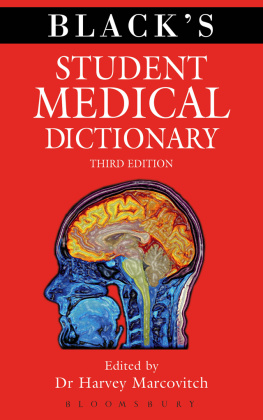
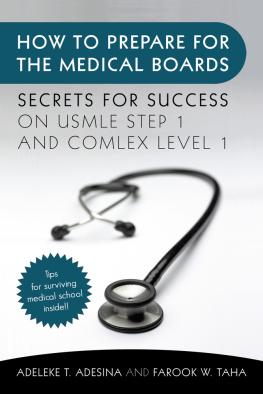
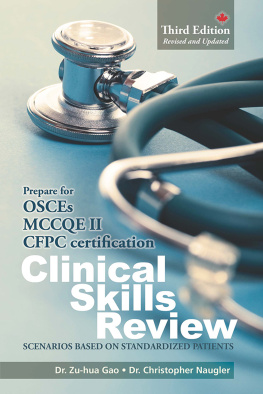
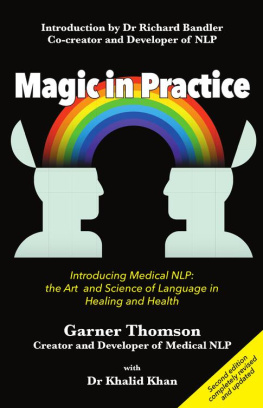
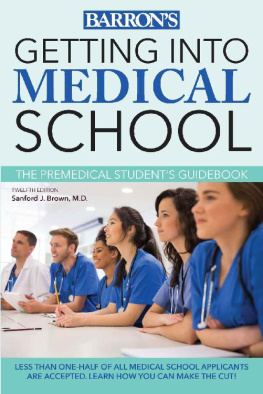
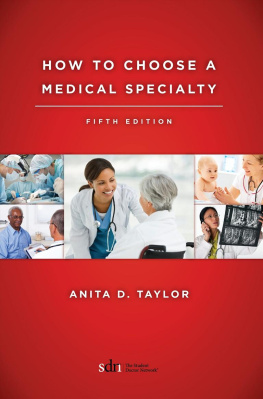
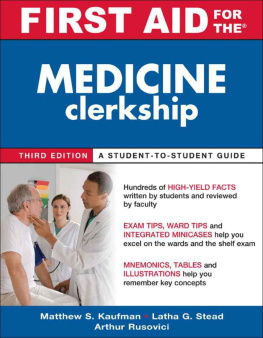
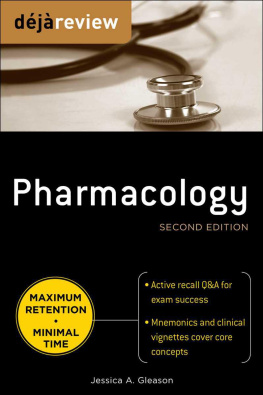
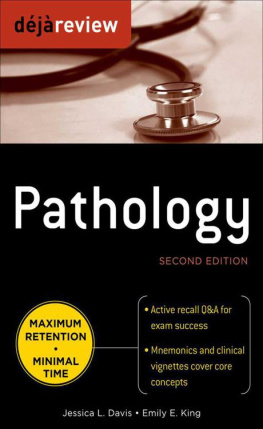
 CRC Press Taylor & Francis Group 6000 Broken Sound Parkway NW, Suite 300 Boca Raton, FL 33487-2742 2016 by Khalid Khan CRC Press is an imprint of Taylor & Francis Group, an Informa business No claim to original U.S. Government works Printed on acid-free paper Version Date: 20160505 International Standard Book Number-13: 978-1-4987-3938-2 (Paperback) This book contains information obtained from authentic and highly regarded sources. While all reasonable efforts have been made to publish reliable data and information, neither the author[s] nor the publisher can accept any legal responsibility or liability for any errors or omissions that may be made. The publishers wish to make clear that any views or opinions expressed in this book by individual editors, authors or contributors are personal to them and do not necessarily reflect the views/opinions of the publishers. The information or guidance contained in this book is intended for use by medical, scientific or health-care professionals and is provided strictly as a supplement to the medical or other professionals own judgement, their knowledge of the patients medical history, relevant manufacturers instructions and the appropriate best practice guidelines. Because of the rapid advances in medical science, any information or advice on dosages, procedures or diagnoses should be independently verified.
CRC Press Taylor & Francis Group 6000 Broken Sound Parkway NW, Suite 300 Boca Raton, FL 33487-2742 2016 by Khalid Khan CRC Press is an imprint of Taylor & Francis Group, an Informa business No claim to original U.S. Government works Printed on acid-free paper Version Date: 20160505 International Standard Book Number-13: 978-1-4987-3938-2 (Paperback) This book contains information obtained from authentic and highly regarded sources. While all reasonable efforts have been made to publish reliable data and information, neither the author[s] nor the publisher can accept any legal responsibility or liability for any errors or omissions that may be made. The publishers wish to make clear that any views or opinions expressed in this book by individual editors, authors or contributors are personal to them and do not necessarily reflect the views/opinions of the publishers. The information or guidance contained in this book is intended for use by medical, scientific or health-care professionals and is provided strictly as a supplement to the medical or other professionals own judgement, their knowledge of the patients medical history, relevant manufacturers instructions and the appropriate best practice guidelines. Because of the rapid advances in medical science, any information or advice on dosages, procedures or diagnoses should be independently verified.